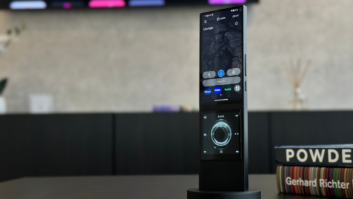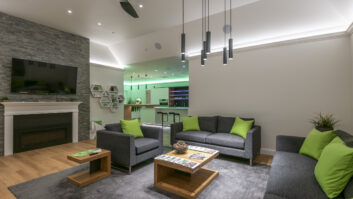The aftermarket’s most recent answer to the Ford Sync may not be a CD or DVD head unit but a car computer, produced by Azentek in conjunction with Microsoft — the same company that helped Ford to develop the Sync.
The Azentek “instant on” computer offers better voice control than the Sync, claimed Azentek sales and marketing VP Pete Muller. It also adds Internet capability and Internet radio plus the full function of a PC. It can read back email and allows a user to respond by recording a WAV file attachment.
Called the Altas infotainment center, it is expected to ship in the first quarter of 2009, possibly in January. It will be available in single- and double-DIN formats at a suggested retail of $2,799, albeit far above the $399 of the Sync. Less-expensive versions of the Atlas are due in the future. Muller said the company aimed for the high end first, as, “We want to establish Azentek as a high-end brand.”
Azentek said its car computer has already been adopted by a high-end German car maker in a 2010 vehicle, making it the first car computer to become standard equipment. The name of the car company should be announced in three months, Muller said.
The aftermarket version of Atlas will use voice control to let users tune to specific stations, switch sources, control GPS navigation and control system commands such as “Read my email” or “Web browser” — all capabilities not permitted by the Sync. However, like the Sync, the Azentek permits voice control of music indexing on MP3 players such as the iPod, Zune and Bluetooth music-ready cellphones, and allows hands-free calling.
Both Microsoft and Intel partnered with Azentek on R&D and marketing for the Atlas, which was first introduced as a prototype a year ago.
The Atlas runs an embedded version of Vista that allows the “instant on” access. Through Wi-Fi, users can pull up to a Starbucks, Wendy’s or other hotspot to check email or surf the Web at no charge.
Azentek said many applications designed for the Atlas are on the horizon as the car PC offers an open development architecture.
“One developer here designed an application that pulls stock prices off the Internet. Another developer is talking about a calculator. So you are in line on the drive up lane at the bank with a bunch of checks to total up and the car will tell you the sum,” said Muller, adding, “Developers are emailing us. There’s a lot of interest.”
The problem with the car computers offered in the past, such as those offered by QPC, is that they were aimed at the technical enthusiast, Muller said, claiming the Atlas is “aimed at the soccer mom who’s keeping track of her son’s games and play dates.” She can do this via Outlook on the Atlas.
The aftermarket may also be more receptive to a car PC now that sales of CD players are waning. “I’ve seen the market continue to go down in in-dash CD, and the retailers really are waiting for something to re-launch the aftermarket … the car market is waiting for the next big thing,” said Muller
But retailers remember the past car PC failures, including that of the Clarion Auto PC. Mike Cofield, president of Custom Sounds, said, “We’re not going to be guinea pigs anymore.” He said of car PCs to date, “All of them have weird idiosyncrasies. For whatever reason, they’ve never caught on.”
The Azentek Atlas has a touchscreen user interface for use while driving, but it can also be controlled by a wireless keyboard with built-in mouse, when the driver is parked. It has a 6.5-inch screen with large touchscreen buttons; Sirius, XM and HD Radio capability; and can connect to iPods and Internet radio. Three Internet options include USB broadband modems, built-in Bluetooth paired with a cellphone (with a subscription to a data plan) and Wi-Fi.
The Atlas has a dual-core processor with 1GB to 2GB of RAM and a 120GB hard drive. It can also store movies that can be sent to rear-seat screens.












